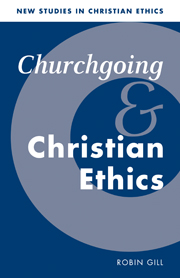Book contents
- Frontmatter
- Contents
- List of tables
- Preface
- List of abbreviations
- Introduction
- PART ONE THE THEORETICAL CONTEXT
- 1 Churchgoing and the bias of virtue ethicists
- 2 Churchgoing and the bias of sociologists
- 3 Four theories of churchgoing
- PART TWO THE EVIDENCE
- PART THREE THE IMPLICATIONS
- Postscript
- Works cited
- Index
1 - Churchgoing and the bias of virtue ethicists
Published online by Cambridge University Press: 02 December 2009
- Frontmatter
- Contents
- List of tables
- Preface
- List of abbreviations
- Introduction
- PART ONE THE THEORETICAL CONTEXT
- 1 Churchgoing and the bias of virtue ethicists
- 2 Churchgoing and the bias of sociologists
- 3 Four theories of churchgoing
- PART TWO THE EVIDENCE
- PART THREE THE IMPLICATIONS
- Postscript
- Works cited
- Index
Summary
The rise and growing dominance of virtue ethics within Christian ethics has brought with it a new emphasis upon the moral importance of churchgoing. Church communities and the stories, beliefs and virtues that they contain within their worship and liturgies have received renewed attention. As a result there is now a clear bias towards churchgoing and active membership of church communities amongst many Christian ethicists. However, with this bias has come a less congruent bias – a bias towards idealised rather than actual church communities. Perhaps this latter bias was inevitable given such a theoretical emphasis upon communities that, in both the past and the present, have often appeared fragile and ambiguous. Yet idealised communities ill fit a virtue ethic whether Christian or secular. The latter primarily requires actual communities to mediate virtues and to shape moral character.
This chapter will set out these claims in detail by taking an overview of the work of Stanley Hauerwas. Amongst Christian ethicists in North America today Hauerwas is outstanding. He has more influence and polarises more opinions than any other Christian ethicist of his generation. Within the discipline, Alasdair MacIntyre and Charles Taylor have both been highly influential as sympathetic philosophers. Yet, especially in North America, it is the work of Hauerwas which is widely read and discussed. In meetings of the American Society of Christian Ethics it is now quite usual to find several papers analysing his work, with only occasional references to MacIntyre and Taylor.
- Type
- Chapter
- Information
- Churchgoing and Christian Ethics , pp. 13 - 30Publisher: Cambridge University PressPrint publication year: 1999



